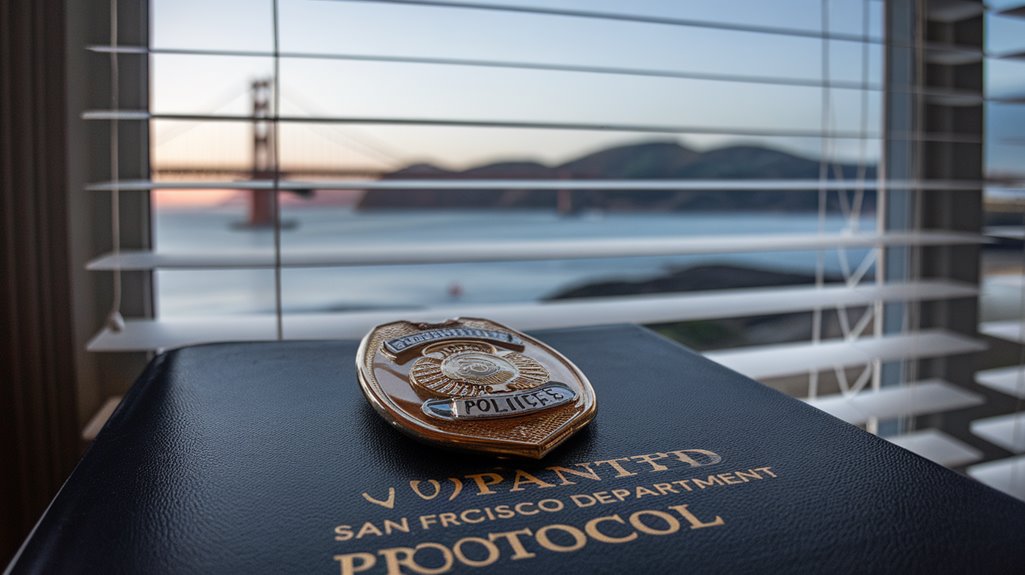The Miranda warning protects constitutional rights during police interactions in the Bay Area's diverse communities. Police must inform suspects of their right to remain silent and have an attorney present during questioning. Language barriers and cultural differences make proper translation essential, as statements made without proper Miranda warnings are inadmissible in court. Local organizations provide free legal resources in multiple languages. Understanding these rights helps residents better navigate law enforcement encounters and access available protections.
Key Takeaways
- Miranda warnings are legally required in the Bay Area when suspects are in custody and being questioned, ensuring protection against self-incrimination.
- The Bay Area's diverse population requires accurate translation services in over 150 languages to ensure Miranda rights are properly communicated.
- Local legal aid organizations provide free multilingual support through hotlines and clinics, helping residents understand their Miranda rights.
- Courts evaluate age, developmental stage, and prior law enforcement contact when assessing Miranda rights understanding, especially for young suspects.
- Improperly administered Miranda warnings in the Bay Area can result in evidence being thrown out and potential civil rights lawsuits.
The History Behind Miranda Rights in America

Before becoming a standard practice across America, Miranda rights emerged from a significant 1963 case in Phoenix, Arizona. Police arrested Ernesto Miranda for rape and kidnapping after a witness identified his license plate. During a two-hour interrogation, officers never informed Miranda of his constitutional rights, yet obtained a signed confession that led to his conviction.
The historical context of this case changed American law enforcement forever. After the ACLU appealed to the Supreme Court, a 5-4 decision in 1966 established new requirements for police interrogations. The Miranda implications were clear: officers must inform suspects of their right to remain silent, right to an attorney, and right to state-provided counsel if they cannot afford one. This ruling aimed to protect individuals from self-incrimination in the inherently coercive environment of police questioning.
Understanding Your Basic Miranda Rights
Miranda rights serve as fundamental legal protections that every person should understand. These rights include the ability to remain silent during police questioning and the right to have an attorney present during interrogation. If someone cannot afford a lawyer, the court will appoint one.
These legal protections guarantee that anything said can be used in court, so individuals must carefully consider their responses. People can stop answering questions at any time by clearly stating they want to invoke their rights. Simply staying quiet isn't enough – rights must be actively claimed. While police need confirmation that suspects understand their rights, continuing to answer questions after receiving warnings can count as giving up these protections. This makes it essential to explicitly state when invoking Miranda rights during police questioning.
When Miranda Warnings Are Required in California

Law enforcement officers in California must give Miranda warnings when a person is both in custody and being questioned about a crime. During routine traffic stops, officers typically do not need to give Miranda warnings unless they place the driver under arrest and begin asking crime-related questions. The key factor is whether a reasonable person would feel free to leave the situation, with formal arrests clearly requiring Miranda warnings while voluntary conversations with police do not.
Custody vs. Free Contact
Understanding when Miranda warnings are required depends largely on whether police contact qualifies as "custody" or "free contact" under California law. The key difference lies in whether a reasonable person would feel free to leave the interaction.
| Situation Type | Miranda Required? | Key Features |
|---|---|---|
| Custody | Yes | Physical restraint, station questioning, confined space |
| Free Contact | No | Traffic stops, voluntary talks, routine encounters |
| Gray Areas | Maybe | Depends if person feels free to leave |
Police encounters start as free contact but can shift to custody if officers use physical restraint or coercive language. While routine traffic stops and voluntary conversations don't need Miranda warnings, questioning at police stations or in patrol cars typically requires them. The distinction helps both officers and civilians understand their rights and obligations during law enforcement interactions.
During Traffic Stops
Traffic stops in California operate under specific rules regarding Miranda warnings, with most roadside encounters classified as non-custodial interactions. During routine traffic stops, officers can ask basic questions about identity, vehicle registration, and even potential intoxication without reading Miranda rights.
Many drivers experience custodial confusion during traffic stop questions, unsure of their rights when being questioned. However, the law is clear: Miranda warnings are only required after a formal arrest takes place. This means officers can conduct field sobriety tests, request breath samples, and ask about drinking without providing Miranda warnings. Only when an officer places someone under arrest do Miranda rights become necessary for further questioning. Spontaneous statements or responses to routine booking questions remain admissible even without Miranda warnings.
Arrest vs. Questioning
California officers must consider two key factors before reading Miranda rights: whether a person is in custody and whether they plan to conduct an interrogation. Being arrested doesn't automatically require Miranda warnings unless questioning follows.
Custody definitions focus on significant restrictions of freedom, similar to an arrest situation. However, brief detentions like traffic stops typically don't qualify as custody. When it comes to interrogation tactics, officers can ask basic questions about identity or vehicle ownership without triggering Miranda requirements. They can also bypass Miranda for public safety concerns, such as locating weapons.
If someone makes voluntary statements before being questioned, these can be used as evidence even without Miranda warnings. The key is whether police plan to ask questions that could lead to self-incrimination. However, once officers begin a formal interrogation, they must provide Miranda warnings to protect the individual’s rights. This is why legal experts often advise people to be cautious about what they say, as certain statements could be used against them. In fact, many attorneys warn, “never say this to police” when it comes to admitting fault or providing unsolicited details without legal representation.
Common Misconceptions About Miranda Rights

Many Bay Area residents wrongly believe police must read Miranda rights at the moment of any arrest. In reality, Miranda warnings are only required before custodial interrogations, not during routine traffic stops or casual police interactions. A 2020 California survey showed that 45% of people mistakenly thought Miranda rights applied to all police encounters, including basic questioning during traffic violations.
When Police Must Read
Despite widespread depictions in TV shows and movies, Miranda warnings are only legally required in specific situations involving both custody and interrogation. Police must give these warnings when a person is both in custody, meaning they are not free to leave, and about to be questioned about a crime.
Miranda requirements don't apply during routine traffic stops or when someone voluntarily speaks to police. Officers can even use deceptive tactics during questioning, like falsely claiming they have evidence. If someone starts talking about a crime without being asked, police don't need to stop them or read Miranda rights. However, once a person is in custody and police want to ask questions, they must issue the warning or risk having any statements thrown out of court.
Rights Beyond Traffic Stops
While traffic stops represent one common police interaction, people often misunderstand their Miranda rights in other everyday situations. Many individuals believe officers must read Miranda rights during every encounter, but this only applies when in custody and being interrogated.
Key misconceptions about Miranda rights:
- Police don't need to read rights during casual conversations or voluntary interviews
- Miranda warnings aren't required for basic identification questions
- The right to legal representation exists even if rights haven't been read
- Silence can be used as evidence if Miranda rights weren't given
- Civil liberties remain protected regardless of whether rights are read
Understanding these distinctions helps people navigate police interactions more effectively. The key is knowing when Miranda rights apply and when they don't, rather than assuming they're required for every law enforcement encounter.
The Role of Language and Translation in Bay Area Miranda Warnings
As the Bay Area's population becomes increasingly diverse, the accurate translation of Miranda warnings presents significant challenges for law enforcement agencies. Translation challenges arise from dialect differences across Spanish-speaking communities, where terms like "libre" versus "sin costo" can cause confusion about free legal services. Cultural contexts also pose issues, particularly for ASL interpreters who must convey complex legal concepts accurately.
The legal implications of poor translations are serious. Courts have thrown out evidence when Miranda warnings weren't properly translated, especially in Spanish-language cases. To address these challenges, Bay Area agencies use Language Line Services for over 150 languages when bilingual officers aren't available. They also share interpreters across jurisdictions. However, without universal standards to measure translation quality, ensuring accurate Miranda warnings remains an ongoing challenge.
Local Law Enforcement Protocols for Miranda Warnings

Bay Area law enforcement agencies follow strict protocols when administering Miranda warnings to suspects in custody. Police training emphasizes Miranda compliance across all types of cases, from minor misdemeanors to serious felonies. Officers must deliver warnings before any questioning begins in situations where suspects are confined or restrained.
- Warnings must be given in standardized language
- All felony and misdemeanor cases require Miranda warnings
- Officers cannot question suspects in custody without warnings
- Public safety emergencies allow rare exceptions
- Basic ID questions don't need Miranda warnings
The protocols require officers to assess custody thresholds using an "objective person test." This means evaluating whether a reasonable person would feel free to leave the situation. Law enforcement must document all Miranda procedures carefully to guarantee admissible evidence in court.
Your Rights During Custodial Interrogation
A person enters police custody when they reasonably believe they are not free to leave, at which point Miranda rights must be read before questioning begins. Individuals can exercise their Miranda rights by clearly stating they wish to remain silent or want an attorney present, which requires police to immediately stop the interrogation. Despite potential pressure from law enforcement to continue talking, people in custody have the absolute right to end questioning at any time, even if they initially agreed to speak with police.
When Custody Begins
Under Miranda law, custody begins when police greatly restrict someone's freedom of movement. The custody definition extends beyond physical handcuffs to include psychological restraints and any significant limitation of freedom. Courts look at all circumstances to determine if a reasonable person would feel free to leave the situation.
- Police don't need to make an arrest for custody to begin
- Traffic stops usually aren't custody unless they become restrictive
- Being questioned at a police station might not count if you can leave
- Both physical and mental restraints can create custody
- Isolation or confinement in a controlled space counts as custody
Courts use a "totality of circumstances" test to decide if someone is in custody. This means looking at everything happening at that moment, from police behavior to the setting and length of interaction.
Invoking Your Miranda Rights
Once police establish custody, individuals have specific rights they can invoke to protect themselves during questioning. A person can stop police interrogation by clearly stating "I want to remain silent" or "I need an attorney." When someone invokes these rights, police must immediately stop asking questions.
Invoking rights properly means being direct and unambiguous. Simply telling officers "I want a lawyer" is enough to activate Miranda protections. After someone requests legal representation, police cannot continue questioning until an attorney is present. The key is that suspects must explicitly express their desire to remain silent or have counsel – they cannot hint at it or use vague language. Any statements made after properly invoking rights cannot be used against the person in court.
Dealing With Police Pressure
Police officers use many tricks to get people to talk during questioning, even after reading Miranda rights. During police encounters, officers may legally use deception and psychological pressure to obtain confessions. They might pretend to have evidence that doesn't exist or minimize the seriousness of the situation to make suspects talk.
- Officers can legally lie about having DNA or fingerprint evidence
- Police may use aggressive tactics like yelling or slamming objects
- Interrogation tactics often include false promises of leniency
- Officers might pretend you're just a witness, not a suspect
- Police can listen to your private conversations with others
Legal Consequences of Miranda Violations in California Courts
California courts impose several penalties when law enforcement fails to properly give Miranda warnings during custodial interrogations. The most significant consequence is that any statements made by suspects without proper warnings become inadmissible as evidence in court. This protection extends to evidence discovered as a result of those statements. Additionally, if law enforcement fails to provide Miranda warnings, the court may also take into account the circumstances surrounding the interrogation, potentially leading to further examination of the officers’ conduct. This situation highlights the importance of adhering to procedural guidelines, which is crucial not only in custodial settings but also in contexts involving implied consent laws in California. Ultimately, maintaining the integrity of the interrogation process safeguards the rights of the accused and ensures that justice is upheld.
The Miranda implications go beyond just excluding evidence. Police departments that systematically violate Miranda rights can face civil rights lawsuits under federal law. While individual officers rarely face penalties for simple mistakes, departments that train officers to bypass Miranda protections can be held liable. Courts may also block the use of improperly obtained statements even for impeachment purposes when there's evidence of coercion. These rules aim to protect suspects' constitutional rights and guarantee fair treatment during police questioning.
Special Considerations for Non-English Speakers and Immigrants

When suspects don't speak English well, giving Miranda warnings becomes much more complicated. The Bay Area's high number of non-English speakers creates unique challenges for law enforcement. Translation accuracy is essential since courts require that immigrants truly understand their rights, not just hear them in English. Courts often throw out cases where immigrant rights weren't properly explained in the suspect's main language.
Language barriers in Miranda warnings pose serious legal risks, as courts demand suspects fully comprehend their rights in their native tongue.
- 24% of Bay Area residents have limited English skills
- Over half of police still use English-only warnings with non-English speakers
- Spanish translations often contain errors or miss key rights
- Phone interpreters are used when in-person help isn't available
- Courts reject cases if suspects don't understand rights in their native language
Many police departments lack proper translation tools beyond Spanish, forcing them to rely on outside help. This gap puts both officers and suspects at risk during questioning.
Recent Bay Area Cases Involving Miranda Rights
Recent Bay Area court decisions have reshaped how Miranda rights apply in complex criminal cases. The Joseph H. case sparked significant debate about juvenile vulnerability during police interrogations. This led to Senate Bill 1052, which now requires minors to consult with attorneys before waiving their rights.
| Case Type | Location | Key Finding |
|---|---|---|
| Juvenile Murder | Oakland | 10-year-old's waiver upheld |
| Multiple Robbery | San Jose | Prior warnings applied to later cases |
| Homicide | Santa Clara | Cross-jurisdiction warnings valid |
| Youth Rights | Bay Area | Mandatory attorney consultation |
Several Bay Area cases highlighted the need for special protections for young suspects. Courts now examine factors like age, developmental stage, and prior law enforcement contact when evaluating Miranda waivers, particularly in cases involving minors.
Resources for Legal Support and Rights Education

The Bay Area offers numerous free and low-cost legal resources to help residents understand and protect their rights. Various legal aid organizations provide support through hotlines, workshops, and in-person consultations. Community resources are available in multiple languages, ensuring accessibility for diverse populations.
Access to justice thrives in the Bay Area through diverse legal aid services, ensuring all residents can understand and defend their rights.
- Bay Area Legal Aid offers a multilingual advice line at 800-551-5554
- Free legal clinics run monthly at 125 Twelfth Street in Oakland
- Online self-help resources available through LawHelpCA.org
- Specialized support for Spanish speakers through Centro Legal de la Raza
- Free immigration workshops provided by CARECEN and IIBA
These services help residents navigate complex legal matters, from Miranda rights to housing issues. Organizations like East Bay Community Law Center and Legal Access Alameda provide hands-on assistance through workshops and clinics, making legal support accessible to those who need it most.
Frequently Asked Questions
Can Police Officers Lie About Evidence During an Interrogation After Miranda Rights?
Yes, police officers can legally lie about evidence during interrogation tactics after Miranda rights are given. Courts have consistently allowed officers to make false claims about having witness statements, DNA evidence, or confessions from accomplices. However, there are legal implications and limits – police cannot fabricate physical evidence or use tactics that would make a confession involuntary. This deceptive practice was upheld in Frazier v. Cupp (1969).
Do Miranda Rights Apply When Speaking to Private Security Guards?
Ever wonder why private security guards don't read you those famous rights you see on TV? That's because Miranda rights don't apply when talking to private security personnel. They aren't government agents, so they don't have the same legal implications as police officers. Anything you say to security guards can still be used against you in court, but they aren't required to give Miranda warnings before questioning you.
How Long Do Miranda Rights Last Once They Are Given?
Miranda rights don't actually expire once given, but their legal implications change based on specific circumstances. After invoking rights by requesting an attorney, there's a 14-day protection window before police can try questioning again. If someone is released from custody, police must wait 14 days before attempting new interrogations. Each new request for an attorney restarts this 14-day timer. The protection isn't permanent like it used to be.
Can Miranda Rights Be Revoked by Law Enforcement After Initially Given?
No, law enforcement cannot revoke Miranda rights after they are given. Miranda revocation implications are clear – only the suspect has the authority to waive or revoke these rights. Law enforcement authority does not extend to removing these constitutional protections once they've been provided. If a suspect invokes their Miranda rights, police must stop questioning immediately. These rights remain in effect until the suspect personally chooses to revoke them.
Are Miranda Warnings Required for Questioning About Someone Else's Criminal Activity?
Miranda warnings are generally not required when police question someone about another person's criminal activity, as long as the person being questioned is considered a witness rather than a suspect. Third party involvement in questioning can proceed without Miranda if the focus is on witness cooperation rather than self-incrimination. However, if questioning shifts to implicate the witness in criminal activity, Miranda warnings become necessary to protect their rights.
Conclusion
Miranda rights protect everyone in the Bay Area, from citizens to immigrants, English speakers to non-English speakers. While these rights seem simple, they're vital when dealing with law enforcement. Local resources and legal support can help people understand and defend their rights. After all, shouldn't everyone know how to protect themselves when interacting with police? Knowledge of Miranda rights is essential for maneuvering the justice system safely and effectively.
